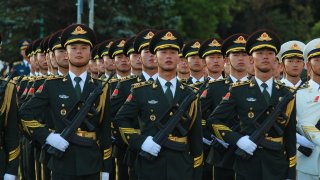Taiwan and China’s Nuclear Shield
If war with China unfolds under the shadow of nuclear escalation, it will be effectively a two-front war with Russia included, regardless of whether one or both powers are actually engaged in the fighting.
To be clear, it is in the relative interest of the United States, because of the superior resources available to the United States and friendly powers, that any conflict over Taiwan remains non-nuclear. In all probability, even the loss of Taiwan would not justify the first use of nuclear weapons by the United States from a strategic standpoint. Unlike the huge economic loss resulting from prospective Soviet conquests in Western Europe, which supposedly justified initiating a nuclear conflict on the Rhine or even at the inner German border, Taiwan is not as economically crucial to the survival of the free world as a whole. It goes without saying that American losses in a nuclear war might exceed the total population of Taiwan by many times. Furthermore, the loss of smaller democracies to totalitarian occupation or conquest, as was the case in Eastern Europe in 1945, might eventually be reversed by a competent containment strategy targeting China. The long-term advantage that democratic states possess in forming larger economic and military coalitions would be lost to the costs of a strategic countervalue nuclear war.
However, we do not get to choose whether or not a conflict with China will go nuclear. It is clear that the purpose of China’s unprecedented nuclear build-up is to either coerce the United States into abandoning its Pacific allies or to defeat America at any level of conflict. So far, owing to America’s obstinate refusal to recognize the end of the long-expired post-Cold War nuclear honeymoon, this strategy is proving extraordinarily successful.
As it was for China, so it is for the United States. If America’s foreign policy goals extended no further than its own shores, a minimum deterrent policy might have some credibility. Reasonable Chinese leaders might be convinced that America would engage in total war—even at a great disadvantage—rather than unconditionally surrender. Unfortunately, America cannot afford Switzerland’s foreign policy because such a policy would most likely result in the domination of the rest of the world by China and Russia, which could then use their conquered resources to overcome the United States. But the present course of maintaining a forward-leaning foreign policy, to wit, fighting a proxy war against Russia while also attempting to hold Taiwan, all from a position of self-imposed nuclear inferiority, provides the worst of both worlds. Under such conditions, America’s armed forces are likely to fight—and likely to lose—despite the vast sums expended every year on general-purpose forces, which an adversary with a decisive advantage in nuclear weapons can easily brush aside.
As the bipartisan 2023 Strategic Posture Report insisted, the United States must take urgent steps to redress the nuclear balance. At a minimum, the U.S. government must finally admit the demise of the New START Treaty, which has been well and truly dead for over a year and to which China was never a party in the first place. It must also load the reserve strategic warheads, which were kept specifically for this eventuality, and accelerate, as far as possible, the deployment of new theater nuclear weapons. To these requirements, we add the even more urgent necessity of ensuring a survivable command and control system for U.S. nuclear forces, which are now increasingly threatened by hypersonic weapons and no-warning orbital attacks.
All of these measures combined will cost a tiny fraction of U.S. defense expenditures and would be necessary to ensure the security of the nation even if we were not living in a period of extraordinarily high international tensions. They will not restore parity with the Sino-Russian combination. Still, they will provide some much-needed breathing space, within which we may decide upon the long-term requirements for the strategic competition with China. In the meantime, we can at least be grateful that the present situation may be so substantially remedied at such a minimal expense. It is long past time to do the bare minimum.
Ben Ollerenshaw specializes in nuclear strategy and strategic studies in the International Security program at Macquarie University, Sydney, Australia. He can be reached at [email protected].
Dr. Julian Spencer-Churchill is an associate professor of international relations at Concordia University and the author of Militarization and War (2007) and Strategic Nuclear Sharing (2014). He has published extensively on Pakistan security issues and arms control and completed research contracts at the Office of Treaty Verification at the Office of the Secretary of the Navy and the then Ballistic Missile Defense Office (BMDO). He has also conducted fieldwork in Bangladesh, India, Indonesia, and Egypt and is a consultant. He is a former Operations Officer of the 3rd Field Engineer Regiment from the latter end of the Cold War to shortly after 9/11. He tweets at @Ju_Sp_Churchill.
Image: Sergei Prokhorov / Shutterstock.com.

